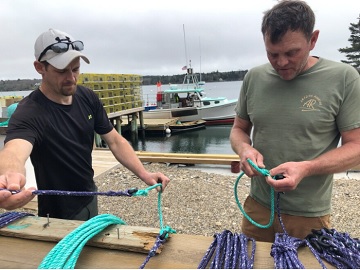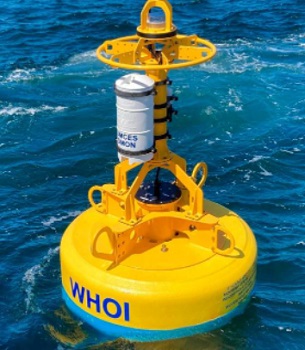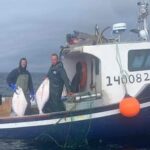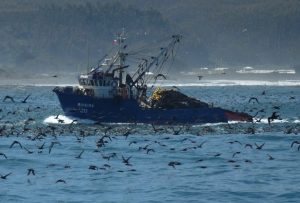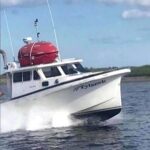Tag Archives: North Atlantic right whale
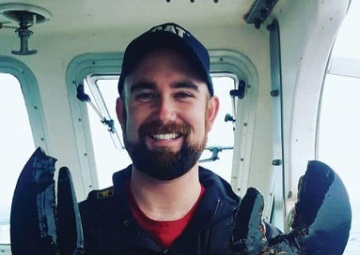
Lobster industry and lawmakers await court decision to determine legality of new restrictions
Maine and Massachusetts harvest more than 90% of the American lobsters sold in the U.S. and most lobstermen and New England lawmakers want to keep it that way. Over the past year, a dispute over new federal regulations on Maine’s lobster industry, intended to protect the endangered North Atlantic Right Whale,,, Mike Sargent became the captain of his own boat at 15. The 29-year-old is worried, however, that if regulations adopted by the National Oceanic and Atmospheric Administration in 2021 are ruled lawful by the U.S. District Court of the District of Columbia, that more expensive and stricter regulations could follow. “There’s talks of ropeless fishing and so on, and those are astronomically expensive and quite frankly could bankrupt this industry at the stroke of a pen,” Sargent said. Massachusetts lobsterman Dave Casoni said that it would cost lobstermen between $500,000-$600,000 to make the switch to ropeless traps, and if passed Casoni believes it could bankrupt the industry. Video, >click to read< 09:16

New England lobster, crab boats could begin using experimental ropeless gear with federal permits
Henry Milliken supervises a prototyping program for the so-called “ropeless” gear at the Northeast Marine Fisheries Science Center in Woods Hole. “Our goal is to work with the fishermen, get them experienced with the gear outside of the closed areas, outside of the times when the right whales are present, and then when everyone is experienced, everyone is comfortable, then permit them to fish in the closed areas,” Milliken says. Most Maine fishermen dismiss the technology as unworkable in the state’s diverse fishing grounds. But a handful are quietly trying it out. >click to read< 19:36

Collins Blocks Expedited Confirmation of NOAA Nominee
In a continuation of her advocacy on behalf of Maine’s lobster industry that has been unfairly targeted by NOAA’s burdensome right whale rule, U.S. Senator Susan Collins rejected a unanimous consent request to confirm a top NOAA official. Senator Collins’ decision to block Jainey Kumar Bavishi to be Assistant Secretary of Commerce for Oceans and Atmosphere comes in response to the agency’s refusal to modify its unworkable Atlantic Large Whale Take Reduction Plan (ALWTRP) that has harmed Maine’s hardworking lobstermen and women. >click to read the press release< 08:49

Who’s really in the trap? How new right whale regs are hurting Maine’s lobster industry
I was five years old, opening my family’s refrigerator door in search of a juice box, when a live lobster fell out and started thrashing around on the floor. Naturally, I immediately screamed and ran out of the kitchen at the sight of this crustacean monster. That was the first time I really put the pieces together of what my father did for a living. As a local Maine lobsterman, he would often bring home portions of his catch while I was growing up. I’m not sure if that would be the case now if he were still in the industry. Even in the short span of my lifetime, the Maine fishing industry has faced new challenges as the world changes around us. >click to read < By Hajna Nagy15:43
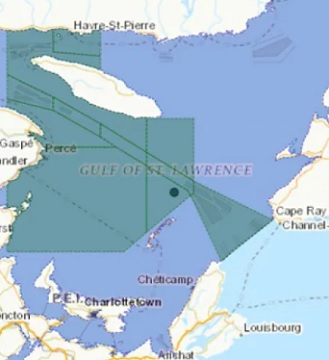
1st Right whale of season spotted in Gulf of St. Lawrence, triggers fishing closure
A surveillance aircraft spotted the whale in the Gulf, north of the Magdalen Islands, on Tuesday, the federal government announced Wednesday afternoon. There is now a 15-day fishing closure in specific fishing grids in the southern Gulf, north of the islands, according to a news release issued by Fisheries and Oceans Canada and the Canadian Coast Guard. In March, the Canadian government announced its fishery and vessel management measures for the 2022 season to protect the endangered whales from entanglements and ship strikes as they migrate into Canadian waters. >click to read< 18:22
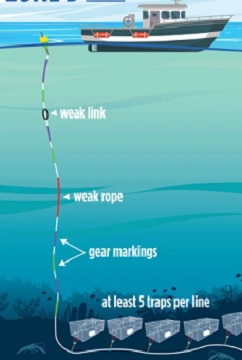
Big Story: Lobstermen fear disaster as new gear regulations take effect
Doug McLennan isn’t worried about the state of the fishery. What worries McLennan and thousands of other Maine lobstermen is the latest round of federal regulations designed to protect the endangered North Atlantic right whale, and additional measures being planned for the next decade. The newest regulations took effect Sunday, though their enforcement has been delayed until supply chain issues for some of the required gear are resolved. This is just the latest in gear regulation change required by the Atlantic Large Whale Take Reduction Plan,,, Many lobstermen have raised concerns about safety and the potential for gear failure and loss of expensive traps under the new rules, and they worry about what is coming next. >click to read< 09:16

Right whale defenders question energy industry donations
A group opposing wind projects off the coast of Massachusetts released a report Tuesday that documents contributions from wind energy developers to environmental groups in the state, donations that the authors of the report say cast questions on the ability of groups to analyze the impacts that wind projects have on the endangered North Atlantic Right Whale. The report, released by the Save Right Whales Coalition, catalogs $4.2 million between wind developers like Vineyard Wind, Bay State Wind, and Orsted to environmental groups in Massachusetts such as the Environmental League of Massachusetts, New England Aquarium, and the Woods Hole Oceanographic Institute. >click to read< 09:35
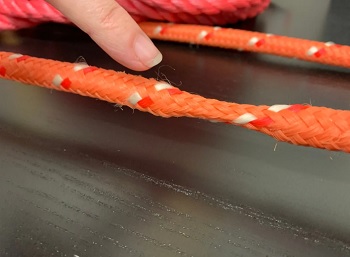
Lobster gear change enforcement delayed because of supply change issues
NOAA said Wednesday morning that it will use a “graduated enforcement effort” until the supply issues have been resolved. The regulations require lobstermen to splice NOAA-approved weak rope or weak plastic links into the lines they use to connect buoys to traps on the ocean floor. But the approved gear has been in short supply as manufacturers struggle to produce enough to outfit the weak rope or weak plastic links fishing fleets. The regulations are intended to prevent whales from becoming entangled in fishing gear, which can result in grave injury or death. >click to read< 13:49
Susan Collins – Scarcity of required gear is making it extremely difficult for lobstermen to meet the May 1st deadline – >click to read< 14:48
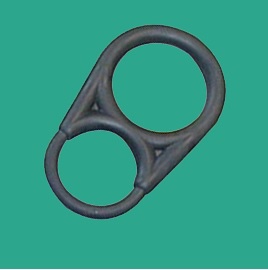
Dealers scramble to supply lobstermen ahead of gear-change deadline
May 1 is the deadline for commercial lobstermen in Maine to trawl up, use weaker rope or insert weak links, and mark gear with the state color purple. But will they be ready? “Everyone’s hoping for a good year, hoping for a good price,” said Virginia Olsen, a Maine Lobstering Union Local 207 member who fishes out of Stonington. “We’re just going to do what we do. We’re gonna go to work.” But first, enough rope and weak links must come into local fishing gear stores to supply the approximately 4,500 commercial lobstermen in Maine, each of whom can haul up to 800 traps. >click to read< 13:26
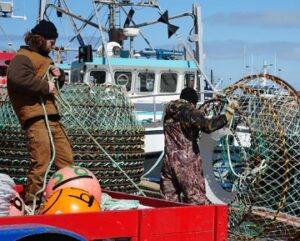
Quebec crabbers angry at DFO
Quebec crabbers who frequent the southern Gulf fishing areas, including large area 12, planned to leave during the weekend. Everyone was ready, on the Islands as in the Gaspé, assure with one voice the president of the Association of Gaspesian crabbers, Daniel Desbois, and Paul Boudreau, representative of the traditional crabbers of the Islands. The factories too, adds the director of the Quebec Association of the fishing industry, Jean-Paul Gagné. According to Paul Boudreau, Fisheries and Oceans informed them that the Coast Guard was not ready and that there was still ice in the gulf. The crabbers and processors of Quebec, who are campaigning for an early opening of the fishery in the spring to avoid interactions with the right whale, are outraged. >click to read< 09:17

Are the whales leaving with the food? Gulf of Maine research raises questions about new lobstering rules
As the Gulf of Maine’s waters warm, recent studies show the main food source of the endangered North Atlantic right whale is moving north, out of Maine waters. And the whales appear to be following them. Such findings haven’t escaped the notice of the Maine lobster industry, which has been referencing them in its legal arguments as to why impending new federal restrictions on lobstering gear won’t help save the whales. Oceanographer Jeffrey Runge, of the University of Maine and the Gulf of Maine Research Institute, said the lipid-rich copepods have been abundant in the Gulf of Maine since Henry Bigelow did his first oceanographic surveys in the early 20th century, but that abundance has dropped by about 70 percent in the past 20 years. >click to read< 11:57
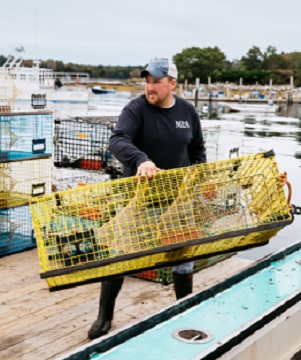
A Complicated Battle in the Gulf of Maine
It was two hours before dawn in the village of Friendship, but for a Maine lobster crew, it was already getting late. Captain Dustin Delano, his sternman, Chris, and his bait guy, Tim, moved in coordinated loops around the deck of the F/V Knotty Lady, stacking traps, thawing redfish heads and coiling lines to the gentle bass notes of engines rumbling below decks. In its own way, it had the feel of a chamber orchestra tuning up. Last cigarettes were lit, smoked and flicked away. And with that, we were off to the grounds. Soon, though, if things go according to a ruling by a federal court in Portland, that schedule would be thrown into chaos. In accordance with a recent modification to a federal whale plan, a 950-square-mile area of prime lobster fishing grounds was set to close in an effort to protect endangered North Atlantic right whales. Enter Green Energy – Where and how Maine would site farms to exploit this potential is an open question. >click to read< 11:09
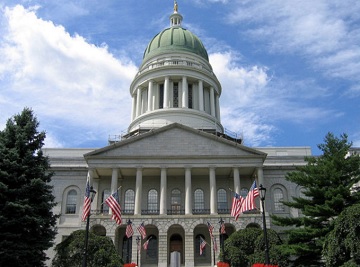
$30 million relief fund for lobstermen gets initial nod in Maine House
Starting on May 1, lobstermen in Maine will have to begin using weaker rope or special links on traplines that are designed to allow a whale to break free from fishing gear. The new federal regulations are aimed at preventing endangered North Atlantic right whales from potentially deadly entanglements. Rep. Billy Bob Faulkingham, a fisherman from Winter Harbor in Hancock County, said the proposed $30 million fund from the state will help mitigate the costs for an iconic industry that generates more than $1 billion for the state. “We are going to be hurting for the money to comply with those rope regulations,” >click to read< 13:37

Lobstermen’s group stresses connection to Maine tourism as new whale regulations approach
The head of the Maine Lobstermen’s Association spoke at the Maine Restaurant & Lodging Expo in Portland Wednesday about threats she said could erase Maine’s lobster industry and hurt the hospitality industry along with it. Association Executive Director Patrice McCarron said the lobster industry is a driver of local economies, with 4,800 vessel owners running independent small businesses, and collectively providing 10,000 jobs on the boats alone, many of those jobs irreplaceable in remote coastal areas. And the industry is booming,,, “With all that’s going so well for us, how could we possibly be looking at our fishing heritage being erased?” McCarron asked the audience. “The reason for that is the North Atlantic right whale.” >click to read< 07:50
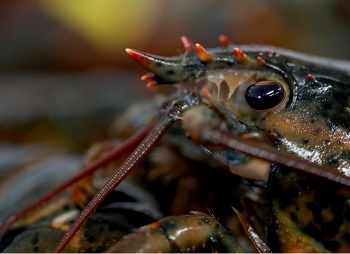
Federal windfall won’t put a stop to state lobster industry relief bills
Although Maine’s lobster industry is set to receive $17 million in federal funding as part of the 2022 omnibus spending package, it is unlikely to affect two bills going through the Legislature that seek more than $30 million in state funds for the industry. The spending bill will bring more than $200 million in funding for projects across the state. For the lobster industry, it includes $14 million to help lobstermen comply with new federal regulations intended to protect endangered North Atlantic right whales, set to take effect May 1, along with $760,000 for the Department of Marine Resources to conduct outreach and education among lobstermen, and $2.3 million for right whale research, monitoring and conservation. >click to read< 17:28

Rebuttal: Ropeless lobstering is not the answer
I grew up in a lobster fishing family and I think I know a thing or two about how to live, thrive, and survive on the water. So, I was surprised to read a recent column, (“Ropeless Technology Ahead of the Wave,” March 2) authored by a “wild mushroom entrepreneur” who seems to think she actually knows best when it comes to the future of the lobster industry. It is accurate to say the Maine lobster industry faces an uncertain future, but not because of the endangered North Atlantic right whale. The real threat comes from Washington, DC,,, >click to read< By John Leonard 09:51

Right whale protection measures to return ahead of migration into Canada
The federal government has announced its fishery and vessel management measures for the 2022 season to protect North Atlantic right whales as the endangered animals migrate into Canadian waters. Officials said in a statement Thursday the Fisheries Department will once again implement seasonal and temporary fishing area closures in the Gulf of St. Lawrence, the Bay of Fundy and other “critical habitat areas” where whales have previously been sighted. They also say Transport Canada is again enforcing vessel traffic measures, including speed restrictions for vessels over 13 metres long, throughout much of the Gulf starting on April 20 to better respond to right whale presence. >click to read< 08:29

Maine Right whale advocates say they feel sidelined by the powerful lobster industry
As Maine’s lobstermen fight national conservation groups over federal gear rules and fishery closures intended to protect endangered whales, they have found fierce allies among the state’s political leaders. That’s left some local advocates for the whales feeling sidelined by the powerful industry. A few weeks ago, lobstermen joined lawmakers to support a bill that would give nearly a million dollars directly to the industry for its legal battles over whale protection measures. None of Maine’s more well-known conservation groups weighed in, but a handful of local advocates for the planet’s estimated 340 North Atlantic right whales testified against it. >click to read< 10:38

Gulf of Maine: Lawsuits over North Atlantic right whale regulations coming to boil
Lobsterman Brian Cates lives so far at the edge of Maine he can look out the windows of his house and see Canadian boats out in Canadian waters. Cates and other New England lobstermen are worried about how the coming regulations issued by the National Marine Fisheries Service will affect their livelihoods. Cates fishes in disputed waters. There, around the mouth of the Bay of Fundy, there’s a strip of ocean claimed by both Canada and U.S. alike called the grey zone. Cates fishes up against Canadian lobstermen, their traps and lines often getting caught up on one another. And the rules coming down from the federal government are not helping, >click to read< 19:14
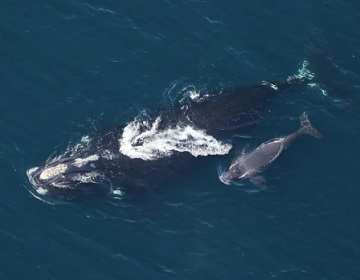
For anyone keeping count, new sighting brings total of North Atlantic Right Whale calves spotted to 15
A new sighting of a right whale calf brings the total spotted this season to 15, the Florida Fish and Wildlife Conservation Commission said Friday. The FWC said a new right whale mother and her calf were seen Wednesday off the coast of North Carolina. According to the FWC, the calf is just a few days old. Right whale calving season spans the months of November through April. “Mothers and calves occur in coastal waters and are known to spend a lot of time resting and nursing at or near the surface of the water where vessel strikes can occur. >click to read< 08:23
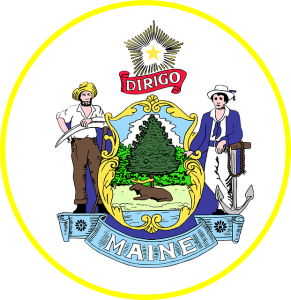
Maine lawmakers vote against lobstering defense fund idea
A Maine legislative committee has voted against a proposal to create a legal defense fund to help the state’s lobster fishing industry fight new restrictions. The Maine Legislature’s Committee on Marine Resources voted against the idea on Tuesday. The fund would have been designed to help the industry challenge rules and regulations intended to protect the North Atlantic right whale. Republican Rep. William Faulkingham, a commercial lobsterman, proposed the idea. >click to read< 09:40

Booker, Blumenthal, Carper, Whitehouse Introduce Legislation to Protect North Atlantic Right Whale
U.S. Senators Cory Booker (D-NJ), Richard Blumenthal (D-CT), Tom Carper (D-DE), and Sheldon Whitehouse (D-RI) introduced the Right Whale Coexistence Act, legislation that would establish a new grant program to fund collaborative research between government agencies, nongovernmental organizations, and maritime industries to reduce human impacts on North Atlantic right whales. Representative Seth Moulton (D-MA-06) is introducing companion legislation in the House. The Right Whale Coexistence Act has been endorsed by the following businesses and organizations, listed here. (It’s quite a list!)>click to read< 16:37

New England and Canada: Seafood watch list weighs ‘red-listing’ lobster. Lobstermen push back
An influential arbiter of the sustainability of seafood is considering whether to drop lobster caught off Maine and Canada from its roster of approved products. The Monterey Bay Aquarium’s Seafood Watch announced this week that it is reviewing whether to add eastern Atlantic lobster harvests and other trap-pot and gillnet fisheries to its Red List,” due to the risk they pose for the survival of the endangered North Atlantic right whale. Last year another seafood rating program, the Marine Stewardship Council, suspended and later reinstated its certification of part of Maine’s lobster fishery. Massachusetts lobstermen are pushing back on the description of their industry as unsustainable. >click to read< 10:39

ACK Residents Against Turbines not aligned with fossil fuel money
The Jan. 21 article by Doug Fraser, “Nuclear and Fossil Fuel Advocates, Wind Foes Among Backers of Right Whale Protection Suits,” misleads the public by attempting to draw a false link between ACK Residents Against Turbines, which opposes development of industrial-scale wind farms off the coast of New England, and other groups associated with the fossil fuel industry. Some groups oppose industrial offshore wind development because it will harm pristine ocean views enjoyed by all; others are opposed to the dramatic increase in electric rates experienced by countries that have adopted it or to the devastating impact it will have on commercial fishing. These are all valid concerns. ACK Residents Against Turbines is opposed to the industrialization of our ocean because the turbines, massive offshore substations, and vast undersea high voltage cable systems will damage the fragile marine ecosystem. >click to read< 15:12 By Vallorie Oliver President, Nantucket Residents Against Turbines
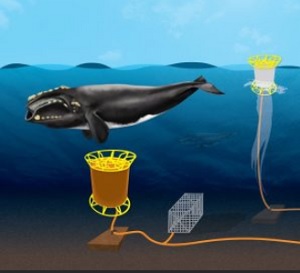
South Atlantic: NMFS accepting input on “ropeless” black sea bass pots
The National Marine Fisheries Service is accepting comments on an application for an exempted fishing permit from Sustainable Seas Technology Inc. The applicant proposes deploying modified black sea bass pots with acoustic subsea buoy retrieval systems in federal waters off North Carolina, South Carolina, Georgia and northeastern Florida. Adaptation of “ropeless” systems for this style of pot fishing could reduce risk to these whales and other marine animals that suffer entanglements, according to the applicant. >click to read< 09:56 fixed gear

Lobster industry needs more time to meet new regulations
Not only is the fishery being forced to change based on insufficient evidence regarding whale entanglements, it is being forced to do so on a schedule that is both too tight and poorly timed. That has left lobstermen scrambling to meet the May 1 deadline for using special weakened rope, rope that is in short supply, if it can be found at all. The Biden administration should see that the industry can’t make this deadline without causing harm. It should be extended to a more reasonable date. Under the new rules, lobster boats must use new weakened rope, or special inserts that are designed to weaken the existing rope, depending on where they fish. >click to read< 10:03






